Abu Dhabi's Nurai Island Resort Shuts Down Temporarily

Skift Take
Nurai Island was the gem of Abu Dhabi hospitality, a favorite among the rich and a featured location on the Real Housewives of Dubai. Now it says it is shutting down temporarily – though it's unclear when it will reopen.
The company says it is being refurbished. "In our pursuit of providing an unparalleled luxury experience, Nurai Island Hotel will temporarily close from Monday, 1 April 2024," a Nurai Island spokesperson told Skift via email. "This scheduled closure forms part of an exciting transformation project for the hotel, in line with development plans to both elevate Nurai Island Hotel’s global appeal and enrich each guest’s e

